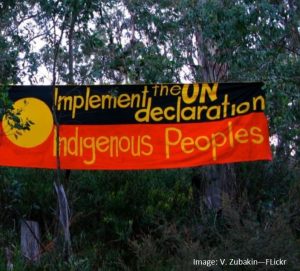
By Catherine Ma
On October 22, 2018, the Faculty of Law’s Office of Indigenous Initiatives hosted Professor Brenda Gunn to discuss the United Nations Declaration on the Rights of Indigenous Peoples (“UNDRIP”). Her presentation primarily focused upon the opportunities and challenges related to implementing UNDRIP in Canada.
UNDRIP enshrines the individual and collective rights of Indigenous peoples in relation to culture, identity, language, education, employment, health, and other issues. These rights are the bare minimum rights of Indigenous peoples; in other words, states are free to recognize stronger rights than those articulated in UNDRIP. Nevertheless, UNDRIP is monumental document since Indigenous peoples directly participated in drafting its provisions. Its adoption signalled a recognition and protection of Indigenous peoples’ rights within the United Nations and international legal systems.
Professor Gunn endorsed Bill C-262 as a framework for implementing UNDRIP. This bill would state affirmatively that UNDRIP applies in Canada; require the federal government to ensure all domestic laws are compliant with UNDRIP, develop and implement a national action plan for achieving UNDRIP’s articles, and report annually to Parliament regarding its progress; as well as clarify that UNDRIP does not diminish or extinguish any §35(1) rights. Professor Gunn emphasized that a national action plan is essential to ensure that different Indigenous peoples can pursue their rights as they understand them. She further suggested that human rights commissions can have an “active role” in promoting UNDRIP and mediating between the Canadian state and Indigenous Peoples.
Professor Gunn asserted that the scope of §35(1) rights must be reconsidered; at a minimum, §35(1) rights must include the rights enshrined in UNDRIP. She reasoned that R v Van der Peet is no longer authoritative law, as §35(1) cannot only protect activities that are “central and integral to the distinctive community practiced continually since contact.” §35(1) must protect all practices, traditions, and customs that are connected sufficiently to the self-identity and self-preservation of Indigenous nations.
UNDRIP at the Asper Centre
The Asper Centre has a dedicated Indigenous Rights Student Working Group (“IRSWG”) that focuses on the constitutional dimension of Indigenous rights. This year, the IRSWG will analyze UNDRIP and Bill C-262 with the intent of drafting general recommendations and observations about actions that ought to be taken in order to implement UNDRIP. This project will examine how UNDRIP affects different legal and policy areas. The group’s other projects include drafting proposed legislation to exonerate Indigenous peoples who were convicted for practicing their ceremonies under past legal regimes; and examining Beaver v Hill for the §35(1) governance issues in relation to Haudenosaunee law and family law.
It will be fascinating to follow the IRSWG’s progress on these projects as the year unfolds.
Catherine Ma is a 3L JD Candidate at the Faculty of Law and was a student leader of the Asper Centre’s Indigenous Rights student working group in 2017-2018.
